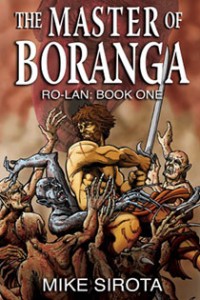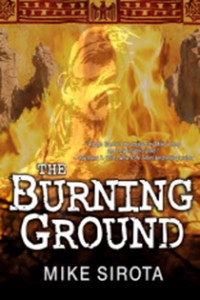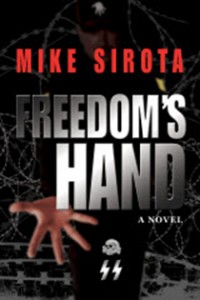Many writers find it a challenge to come up with names for their characters. This post first ran in 2013.
“Hey Mike, where do you come up with those weird character names and place names in your fantasy and sci-fi novels?”
Yeah, I used to get that question, or variations thereof, a lot when I did tons of appearances, signings, conferences, and so on. But it had been a while until, just recently, a reader asked me that question as she happily plowed through my Ro-lan series. I initially gave her my tried and true, smart-assed answer from way back: “I take my kids’ alphabet blocks to the top of the stairs, throw them down and see what comes out.”
But in truth I take the naming of my characters seriously, both in my “far out” and my contemporary stories, as all good writers should. Oftentimes the right—or wrong—names can make—or break—a story. Case in point: before the filming of the movie got underway, the screen treatment listed the name of Harrison Ford’s archaeologist character as “Indiana Smith.” Ya think? Naaah…
AND THE SECRET IS…
 So, my secret? No secret at all. Before I ever write Word One of any story I make an extensive list of names/words, almost always far more than I’ll ever need. I study them for a while, until I have a pretty good idea of what kind of character/village/continent/tree/animal/whatever will match up well with a particular word. When I get to that point in the story, I just plug the word in and forge ahead with the story. Rarely do I have to leave a blank because I’m stuck and want to move on—though it has happened on occasion.
So, my secret? No secret at all. Before I ever write Word One of any story I make an extensive list of names/words, almost always far more than I’ll ever need. I study them for a while, until I have a pretty good idea of what kind of character/village/continent/tree/animal/whatever will match up well with a particular word. When I get to that point in the story, I just plug the word in and forge ahead with the story. Rarely do I have to leave a blank because I’m stuck and want to move on—though it has happened on occasion.
My first book, The Master of Boranga (Ro-lan: Book One), had its title before I began writing. The word “Boranga” showed up somewhere on my list, and to me it had a Polynesian sound to it (think Bora Bora). The world into which my characters travel is a parallel Earth, and since they pass through the vortex in the Hawaiian Islands, Boranga seemed a perfect choice for the island upon which they are shipwrecked.
The main character’s name is Roland Summers. That sort of sounds like a good-guy name, ya think? It also sounds like an old name. I wrote the story in the late ’70s, and initially it took place in the 1950s, so that made sense. In the new version the story is contemporary, but I kept the name for an obvious reason. The people of Boranga have trouble with “Roland” and it comes out “Ro-lan,” which sounds much more heroic—and indicative of the genre (think Conan, Tarzan, etc.).
The female lead—the love of Ro-lan’s life—is Larra, a decidedly feminine name (think Lara Croft—sigh). The other heroines in my fantasy novels have something in common with Larra. See if you can tell. They are: Marana, Sallia, Yashona, Daynea, and Lanira—all lovely names ending in “a”. They are easy to create. (I named one of my characters “Drienne.” It became my youngest daughter’s middle name.)
Villains: ah, I love villainous names! Darth Vader, Sauron, Galbatorix—nasty. For The Master of Boranga I came up with Ras-ek. Think of the sound: rasping. Word association: Rasputin, rascal, rash. Hard consonants are usually good for villainous names, especially “k” and “g” sounds. Gomol, Droom, Zaatha, Ghorus, Buz, Zhorg, Oskhrub, are all names of nasties in my books.
NAMES FOR CONTEMPORARY CHARACTERS
Writing four horror novels and my thriller, Freedom’s Hand, required a different kind of up-front list—the kind of people and place names with which we’re reasonably familiar. So here is my BIG secret regarding many of the names that appear in these stories: they came out of the San Diego phone directory. Seriously! I would flip through it, find a last name that resonated, match it up with a first name and add it to the list. Still, we’d like the good guys to sound like good guys, and the bad guys—well, you know.
 In my Native American-themed ghost story, The Burning Ground, I opened with a long Chapter One that took place in 1849, so I had the additional challenge of coming up with names that fit the era. The Indian names were easy, but not so the miners in the gold camp, which I called Rainbow’s End. These are some of the many that I came up with: Bear Mason, Albert Lick, Sam Beale, William Root, Caleb Morgan, Edwin Brookmire. Sound “western” enough for you?
In my Native American-themed ghost story, The Burning Ground, I opened with a long Chapter One that took place in 1849, so I had the additional challenge of coming up with names that fit the era. The Indian names were easy, but not so the miners in the gold camp, which I called Rainbow’s End. These are some of the many that I came up with: Bear Mason, Albert Lick, Sam Beale, William Root, Caleb Morgan, Edwin Brookmire. Sound “western” enough for you?
In the contemporary story there are no major “bad guys,” the conflict coming from the angry spirits of murdered Maidu Indians, whose graves have been disturbed. My male and female lead protagonists—the good guys—are Barry Cordell and Dana Bowen. The biggest “assholes”—grave robbers who steal artifacts—are lowlife Ray Grider and car salesman Bob Nunn. Minor characters—not bad people, but you probably wouldn’t want to hang out with them—are campers Allison and Richie DeLuca and barflies Paddy McAllister, Lunk Delano, Chuck and Bonnie Reardon, Charlene Hansen, among others. You be the judge if these names fit their “assigned roles.”
Finally, Freedom’s Hand, a thriller that takes place primarily in the mid-’90s, with a 1943 prologue. Nathan Adler, a Polish Jew, bridges the gap between the eras, first as a teen imprisoned in Auschwitz, then as patriarch to the small Lowe family, his daughter Susan, son-in-law David, and granddaughter Heather. (Lowe, as explained in the story, had been shortened from Loewenstein a generation earlier.) Other “good guy” names: security guard Pete Miller, nurse Diane Friedman, fellow prisoner Marcus Hunt, Deputy C.J. Norton.
 There are villains galore, as Freedom’s Hand is the name of a white supremacist group that has raised a concentration camp called Lager in the desert of the American Southwest for the purpose of destroying minorities. See if these names fit: Bobby Rayford, Earl Smith, Oren Hanks, Dooley Webber, Loy Baker, Rawley Decker, Tug Dickey.
There are villains galore, as Freedom’s Hand is the name of a white supremacist group that has raised a concentration camp called Lager in the desert of the American Southwest for the purpose of destroying minorities. See if these names fit: Bobby Rayford, Earl Smith, Oren Hanks, Dooley Webber, Loy Baker, Rawley Decker, Tug Dickey.
But surprisingly—and deliberately—the worst of the worst, the leader of this bunch, does not have such a name. He is Martin Hilliard Brice, and his name comes from his heritage—a key plot point of the story told in flashbacks, and one that will not be given away here.
Next time you read any novel, think about the character names, place names, etc., and know that a great deal of thought has gone into them. We writers don’t just pull them out of our butts.
